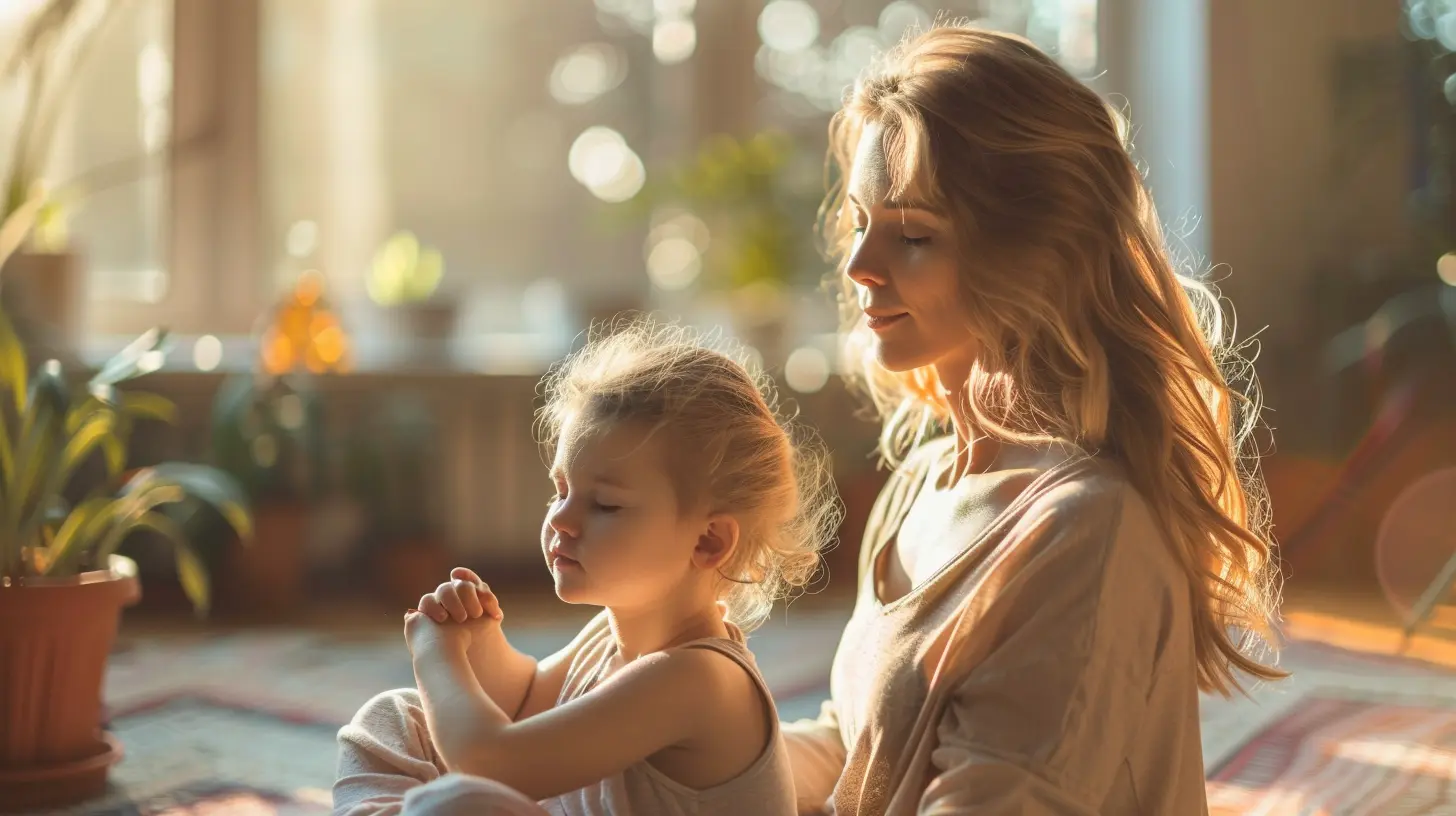Meditation and Mindful Parenting: Cultivating Peaceful Family Dynamics
12 November 2025
Parenting is one of the most rewarding yet challenging journeys in life. Between school runs, tantrums, and the never-ending to-do list, it can feel like you’re constantly juggling a million things at once. Ever felt like you’re running on autopilot, reacting instead of truly engaging with your child? That’s where mindful parenting and meditation come in—like a breath of fresh air amidst the chaos.
Imagine responding to your child’s meltdown with patience instead of frustration. Picture a home filled with calm conversations rather than constant conflicts. Sounds ideal, right? The good news is, incorporating mindfulness and meditation into your daily routine can make this a reality. Let’s dive into how these practices can transform your parenting style and create a peaceful family dynamic.

What is Mindful Parenting?
Mindful parenting is about being fully present with your child—listening without judgment, responding with awareness, and approaching challenges with compassion. It's the opposite of parenting on autopilot, where reactions are driven by stress or habit.At its core, mindful parenting involves:
- Active listening – Truly hearing your child, not just waiting for your turn to speak.
- Emotional regulation – Managing your own emotions so you can respond rather than react.
- Non-judgmental awareness – Accepting your child's emotions and behavior without immediate criticism.
- Compassionate communication – Engaging in calm and empathetic discussions instead of power struggles.
These principles help build strong parent-child relationships based on trust and understanding. But how do you develop these skills? That’s where meditation comes in.

The Power of Meditation in Parenting
Meditation isn’t just for monks in the mountains. It’s a practical tool that trains your mind to be more present, patient, and emotionally resilient—essential qualities for any parent.How Meditation Helps Parents
1. Reduces Stress and AnxietyParenting can be overwhelming, but meditation helps calm the storm. Studies show that regular meditation lowers cortisol levels (the stress hormone), making it easier to handle daily challenges with a clear mind.
2. Increases Emotional Regulation
Ever snapped at your child and regretted it instantly? Meditation strengthens self-awareness, allowing you to notice emotions before they take over. Instead of reacting with anger, you pause, breathe, and respond thoughtfully.
3. Enhances Patience and Presence
Kids have a knack for testing patience—whether it’s refusing to put on shoes or asking “why” for the hundredth time. Meditation helps you stay patient and engaged, making these moments less frustrating.
4. Improves Sleep and Energy Levels
Fatigue makes parenting even harder. Meditation promotes better sleep by quieting the mind, ensuring you wake up refreshed and ready to tackle the day.
Simple Meditation Techniques for Busy Parents
You don’t need hours of silence to meditate. Even 5-10 minutes a day can make a difference. Here are a few methods that fit a busy schedule:1. Mindful Breathing
- Sit comfortably and focus on your breath.
- Inhale deeply through your nose, hold for a second, then exhale slowly.
- If your mind wanders (which it will), gently bring your attention back to your breath.
2. Body Scan Meditation
- Lie down or sit comfortably.
- Close your eyes and focus on different parts of your body, starting from your toes to your head.
- Notice any tension and consciously relax those areas.
3. Loving-Kindness Meditation
- Close your eyes and silently repeat phrases like, “May I be patient. May I be kind. May I be present.”
- Extend this wish to your child: “May my child be happy. May they be healthy. May they feel loved.”
4. Parenting Pause
- Before reacting to your child’s behavior, pause. Take a deep breath. Ask yourself, “How do I want to respond?”
- This simple habit prevents unnecessary outbursts and promotes mindful responses.
Now that we understand how meditation benefits parents, let’s see how mindfulness can be integrated into everyday parenting.

How to Practice Mindful Parenting Daily
Mindfulness isn’t just about meditation—it’s about incorporating awareness into daily interactions with your child. Here’s how you can make mindful parenting a daily habit:1. Listen with Full Attention
When your child talks to you, give them your undivided attention. Put down your phone, make eye contact, and truly listen. This simple act makes them feel valued and understood.2. Take a Breath Before Responding
When frustration rises, take a deep breath before reacting. This short pause helps shift your response from impulsive to intentional.3. Acknowledge and Validate Feelings
Instead of dismissing your child’s emotions with “You’re fine” or “Stop crying,” acknowledge their feelings: “I see that you’re upset. It’s okay to feel this way.” This teaches emotional intelligence and builds trust.4. Set Realistic Expectations
Kids will be kids. They will spill, scream, and test boundaries—it’s part of growing up. Accepting this reduces frustration and helps you respond with patience instead of anger.5. Be Present in Small Moments
Mindfulness isn’t just for big challenges; it’s for everyday moments. Engage fully when playing, reading, or eating together. These small mindful acts strengthen your bond.6. Practice Gratitude Together
Before bed, share three things you're grateful for as a family. This simple ritual cultivates a positive mindset and appreciation for each other.
How Mindfulness Benefits Children
Mindful parenting doesn’t just benefit parents—it positively impacts children, too. When kids grow up in a mindful household, they are more likely to develop:- Better emotional regulation – They learn to handle frustration and disappointment without extreme meltdowns.
- Increased self-awareness – They understand their emotions and triggers better.
- Stronger empathy and kindness – They develop compassion for themselves and others.
- Improved focus and concentration – Mindfulness enhances attention span, which is especially helpful for schoolwork.
By modeling mindfulness, you're teaching your child invaluable life skills that will serve them well into adulthood.
Overcoming Challenges in Mindful Parenting
Let’s be real—mindful parenting isn’t always easy. There will be moments where frustration takes over, and that’s okay. The key is to recognize when you’re slipping into old reactive patterns and gently bring yourself back to mindfulness.Here are some common challenges and how to navigate them:
- Feeling too busy? Start small. Even a one-minute deep-breathing session makes a difference.
- Struggling with patience? Remind yourself that kids are still learning and growing. Reframe challenges as teaching moments.
- Slipping into old habits? Nobody’s perfect! Mindfulness is a practice, not a destination. Keep trying.
Final Thoughts
Mindful parenting and meditation are powerful tools for cultivating a peaceful, loving family dynamic. They help you stay present, patient, and emotionally connected with your child—turning daily struggles into opportunities for growth and bonding.Sure, parenting will always have its challenges, but with mindfulness, you can navigate them with grace and intention. So, take a deep breath, embrace the present moment, and watch how mindfulness transforms your family life.
all images in this post were generated using AI tools
Category:
MeditationAuthor:

Ember Forbes
Discussion
rate this article
1 comments
Kenzie Parker
Transformative practices for nurturing families.
November 17, 2025 at 4:44 PM

Ember Forbes
Thank you for your insightful comment! Transformative practices like meditation and mindful parenting can truly strengthen family bonds and create a more peaceful home environment.


